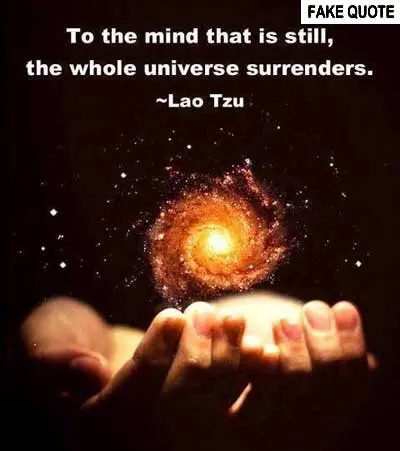|
Tao Te Ching
THE TAOISM OF LAO TZU
|
Fake Lao Tzu Quote"To the mind..."
This is NOT a quote from Tao Te Ching:"To the mind that is still, the whole universe surrenders."
Some Internet posts and memes write "a mind" instead of "the mind," which makes no difference to the meaning. The idea that the universe should surrender to a human mind would be absurd to Lao Tzu. On the contrary, humankind must yield to the Way of Heaven and learn its working in order to adapt to it. Nonetheless, the main method by which we can reach this awareness and accept it is by stillness, wu-wei (non-action), and by letting the world take its course.
But a surrendering universe won't do. Still, this is a genuine quote — though from Chuang Tzu, and not Lao Tzu. The mix-up is understandable, since the quote is in Arthur Waley's introduction to his translation of Tao Te Ching from 1934 (page 58). He used "a mind" and put "still" within quotation marks to signal the complexity of the original Chinese term — and he accredited it to Chuang Tzu, book XIII.1. He did not state what translation of Chuang Tzu it was from, so probably it was his own. It deviates rather significantly from other versions of the Chuang Tzu text. The version by Herbert A. Giles from 1889 reads (page 158):
Occasionally this quote has been ascribed to Lieh Tzu, a 5th century BC philosopher, but the text with his name is considered to be from the 4th century CE. The oldest book with the Lieh Tzu accreditation is The Tao of Painting from 1956, by Mai-mai Sze (page 18), giving the same Waley source page as mentioned above, which points to Chuang Tzu and none else. On this page of Waley's book, he referred the quote to Chuang Tzu in one footnote, and the following note has a reference to Lieh Tzu — but that does not concern this quote. Sze might have mixed that up. The slightly altered version of the quote, with "the mind" instead of "a mind," may have originated with The Religions of Man from 1958, by Huston Smith (page 180), where the quote from Waley's book was used but with this little typo. This wording is also used in the oldest book I have found to accredit Lao Tzu with the quote: Zen and the Art of Gardening from 2000, by Gill Hale (page 217). Several books followed, doing the same. On the Internet, the false Lao Tzu accreditation has also been around for quite long. On Goodreads the quote with "a mind" got its first like January 26, 2008, which was the year after the site was launched. On Facebook the quote started to appear in 2011, but only with Chuang Tzu accreditations. It took until May 2014 for the first post ascribing it to Lao Tzu to appear, with an accompanying meme, using "the mind." The first appearance on the web of the version with "the mind" was in 2010, already then with the Lao Tzu accreditation. In books as well as on the web, it seems that most Lao Tzu references are with "the mind" and most Chuang Tzu references with "a mind." The flawed "the mind" quote is vastly more spread on the web than the correct one: almost 34,000 links versus 5,400 (September 2020). A clear example of how quantity can be misleading on the Internet.
Stefan Stenudd September 22, 2020.
More Fake Lao Tzu QuotesThere are many more fake Lao Tzu quotes examined on this website. Click the header to see a list of them.
Fake interview with the authorClick the header to read a "fake" interview with Stefan Stenudd, the author of Fake Lao Tzu Quotes.
About CookiesMy Other Websites:I Ching OnlineThe 64 hexagrams of the Chinese classic I Ching and what they mean in divination. Try it online for free.
Qi Energy ExercisesThe ancient Chinese life energy qi (chi) explained, with simple instructions on how to exercise it.
Life EnergyThe many ancient and modern life force beliefs all over the world explained and compared.
Taoismen på svenska
Other Books by Stefan StenuddClick the image to see the book at Amazon (paid link).
The Greek philosophers and what they thought about cosmology, myth, and the gods. |
 Tao Te Ching
Tao Te Ching Now it's a book, too!
Now it's a book, too! Tao Quotes
Tao Quotes Cosmos of the Ancients
Cosmos of the Ancients Qi — Increase Your Life Energy
Qi — Increase Your Life Energy Aikido Principles
Aikido Principles Life Energy Encyclopedia
Life Energy Encyclopedia Archetypes of Mythology
Archetypes of Mythology Psychoanalysis of Mythology
Psychoanalysis of Mythology Stefan Stenudd
Stefan Stenudd